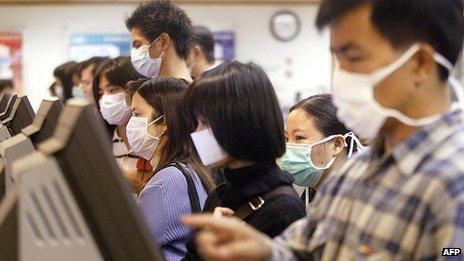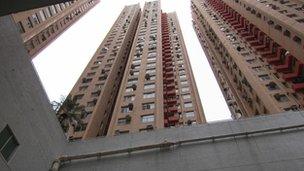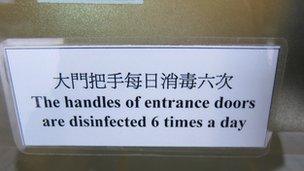Sars legacy still felt in Hong Kong, 10 years on
- Published

Hong Kong became a city gripped by fear when the Sars outbreak emerged in 2003
Bathed in low evening light, Amoy Gardens is a hive of activity.
People duck in and out of noodle joints, fast food chains and convenience stores before heading home to the warren of apartments nestled in the estate's nineteen tower blocks.
But 10 years ago, this densely populated Hong Kong apartment complex, home to 19,000 people, was an eerie ghost town.
Two hundred residents had contracted a deadly respiratory disease, now known as Sars, within a week and no-one knew how it was spreading.
Rats and cockroaches were touted by the press as possible culprits.

Forty two people died and 329 people were infected by Sars at Amoy Gardens during the 2003 outbreak
"Taxi drivers refused to come here," Yip Hing Kwok, a long-time resident and now a local councillor, recalls of the deadly 2003 outbreak.
Alarm turned to panic on March 31 when residents of block E, which experienced the densest concentration of cases, woke up to find that they were unable to leave their building as police and medical staff clad in protective suits enforced an emergency quarantine order.
Police were ordered to chase down those who had already left and residents were later moved to two holiday camps.
"We tried to improve the cleaning of the estate but the number of cases kept increasing," says Mr Yip, who did not live in the blighted block. "The situation was uncontrollable."
Starring role
Amoy Gardens played an unwanted starring role in the 2003 Sars epidemic that infected 8,096 worldwide, and killed 744. The disease, from the same family of viruses as the common cold, emerged in southern China at the end of 2002.
It was carried to Hong Kong by a doctor, whose one-night stay in the Metropole Hotel resulted in seven other guests being infected. These guests then jumped on planes, spreading Sars around the world.

Yip Hing Kwok says residents at Amoy Gardens were discriminated against
While the disease appeared to spread fast, the number of people killed by the virus was relatively small, especially compared with the half a million people who died of influenza in the same year.
But these facts were not known until the disease had come under control in the summer. In March and early April of 2003, as the epidemic seemed to spiral out of control, Hong Kong was a city gripped by fear.
Surgical masks became hot commodities and the city's usually crowded shopping malls, restaurants and mass transport emptied. Expats fled, schools closed and those who could worked from home.
Back then, working as a reporter in the city, I recall being urged by a contact to head straight for the airport as Hong Kong was to be declared an infectious port and sealed from the outside world. A teenager was later arrested in what turned out to be an April Fool's Day stunt.
On the same day, a hugely popular singer and actor, Leslie Cheung, committed suicide by jumping from the 24th floor of the Mandarin Oriental hotel in the middle of the financial district, plunging an already anxious Hong Kong into mourning.
Of course, Hong Kong was not the only place to suffer during the epidemic.
Singapore, Taipei, Beijing and Toronto were hard hit and China's citizens were kept in the dark about the outbreak as the country's leaders initially refused to acknowledge the extent and severity of the disease.
But it is perhaps in Hong Kong, the city that suffered the greatest number of casualties, that its legacy is felt most keenly.
Praise and criticism
Hong Kong earned praise for its transparency in reporting the spread of the disease, in sharp contrast to the cover-up in China.
Like the rest of the city, I was glued to the daily 4.30pm televised press conference during the outbreak that detailed the latest death toll and new cases.

Signs such as this are common in apartment blocks and office buildings around the city
However, the government was criticised for its early handling of the outbreak, particularly at Amoy Gardens, where 42 died and 329 were infected.
Hong Kong has taken the lessons to heart, both in its approach to managing new diseases and maintaining hygiene.
Ten years after the outbreak, apartment and office blocks still boast of how many times daily they sanitise lift buttons, hand rails, door knobs and almost all public surfaces. Masks are de rigueur if you have a cold, and a sneezing or coughing fit on public transport meets with disapproving glances.
Kindergartens, like the one my daughter attends, require parents to record their child's body temperature in a special notebook each morning. If we forget, a note comes back admonishing us.
The threat of a new outbreak is taken extremely seriously and measures are taken that might seem excessive elsewhere. In 2009, the city quarantined 286 guests staying at a downtown hotel for seven days after a Mexican traveller was confirmed as contracting swine flu.
And the city is closely monitoring the emergence of a new Sars-like illness after rumours, later proved unfounded, of a case in Hong Kong in February. The disease has infected 12 and killed six people worldwide.
Bounced back?
Amoy Gardens, like the rest of Hong Kong, has recovered from the Sars outbreak and the economic downturn it triggered with the panache typical of this fast-paced city.
The apartment complex and shopping plaza has since had a HK$60 million (5.1m; $7.7m) facelift, including changes to the drainage and sewage system that was ultimately found to have played a role in the quick spread of the disease at the estate.
Two-bedroom apartments that once struggled to find buyers in the outbreak's aftermath now fetch HK$3.9m (0.33m; $0.5m) - beneficiaries of a recent property boom.
On a tour of the infamous block E, Mr Yip proudly points out the air purifiers in the marbled lobby, where a cleaning lady stands with detergent and a grey cloth poised to wipe away any germs left by visitors.
But the memories are harder to erase.
Mr Yip said many residents, fed up with the stigma attached to their address, left after the outbreak, and those that remained have asked him to deflect the media attention the 10-year anniversary has attracted.
In the residents' committee office, Mr Yip flips through a binder of old newspaper clippings and stops on a picture of a young quarantined boy peering from a window at the armed policemen encircling the entrance to his home - a photograph he says made a particular impression on him at the time.
"l felt so helpless," he tells me. "We want to forget our unhappy image."
- Published19 February 2013